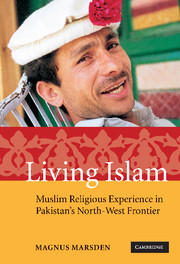Book contents
- Frontmatter
- Contents
- List of maps
- Acknowledgements
- Note on transliteration
- Glossary of Khowar words used in text
- Map 1 Pakistan and neighbouring countries; shaded area corresponds to Chitral district
- Map 2 Chitral district
- 1 Introduction
- 2 Rowshan: Chitral village life
- 3 Emotions upside down: affection and Islam in present day Rowshan
- 4 The play of the mind: debating village Muslims
- 5 Mahfils and musicians: new Muslims in Markaz
- 6 Scholars and scoundrels: Rowshan's amulet-making ulama
- 7 To eat or not to eat? Ismaiʾlis and Sunnis in Rowshan
- 8 Conclusion
- Bibliography
- Index
6 - Scholars and scoundrels: Rowshan's amulet-making ulama
Published online by Cambridge University Press: 22 September 2009
- Frontmatter
- Contents
- List of maps
- Acknowledgements
- Note on transliteration
- Glossary of Khowar words used in text
- Map 1 Pakistan and neighbouring countries; shaded area corresponds to Chitral district
- Map 2 Chitral district
- 1 Introduction
- 2 Rowshan: Chitral village life
- 3 Emotions upside down: affection and Islam in present day Rowshan
- 4 The play of the mind: debating village Muslims
- 5 Mahfils and musicians: new Muslims in Markaz
- 6 Scholars and scoundrels: Rowshan's amulet-making ulama
- 7 To eat or not to eat? Ismaiʾlis and Sunnis in Rowshan
- 8 Conclusion
- Bibliography
- Index
Summary
My brother – however long a man grows his beard, no matter how religious he says he is his heart can never be empty of thoughts of love.
(Twenty-three-year-old Rowshan woman)INTRODUCTION
I have demonstrated in chapter 5, then, that Chitral has a rich tradition of intellectual and creative life embodied in the popularity and sophisticated appreciation of the music and poetry of groups like the Nobles. In this chapter we see something equally striking: the ways in which the region's ulama think and act, and the ways in which villagers think about them, is far from simplistic or straightforward. The statement above, made by a twenty-three-year-old woman, shows that there is, for some Rowshan people, more to the village's ulama than their beards (rigish), rosary beads (dazbeh) and overtly pious lifestyles suggest. Men who have received recognised and certified training in the Islamic sciences are known in Khowar as the dashmanan (singular, dashman) – a word that derives from the Persian danish meaning ‘knowledge’. It is critical that we explore the lives of region's dashmanan given their importance in Chitral life, but also because of how easily one might assume that they are perceived as one-dimensional founts of puritanical ‘Islamic’ authority, either universally deferred to, or ‘resisted’ in a simplistic sense. An exploration of how much more complex the reality is reveals much about both Islam and Chitral, and the very active ways in which Chitral people think about the act of thought and the nature of emotion.
- Type
- Chapter
- Information
- Living IslamMuslim Religious Experience in Pakistan's North-West Frontier, pp. 157 - 192Publisher: Cambridge University PressPrint publication year: 2005



